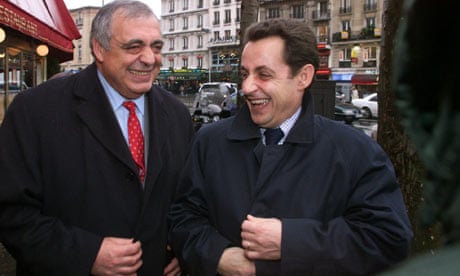In the decade from 1988, French politics was enlivened by the persuasive oratory of Philippe Séguin, a leading rightwing politician and, at the time of his sudden death from heart failure at the age of 66, the president of the court of accounts, France's national audit authority. He had views that many on the British right would recognise: the need to keep national sovereignty intact and the need for some kind of social compact. But a commitment to state intervention and a belief that that would work in a global economy were characteristically French.
Indeed the present prime minister of France, François Fillon, a long-time close friend, saw Séguin as a compound of France's favourite characters. He said that Séguin had the strength of Obelix, the guile of Asterix and the wisdom of Panoramix. But Séguin sometimes lost the recipe for the magic potion.
In the divided and divisive French right, Séguin was the defender of the twin pillars of postwar French nationalism developed by General de Gaulle: the strong republic and the belief that it was the state's duty to combat social divisiveness. As such, he could be distinguished from the more rightwing nationalists such as Charles Pasqua, creator of De Gaulle's secret militia, and the business-friendly liberals in the mould of Alain Madelin. And despite Jacques Chirac's importance over the 30 years of Séguin's political life as party president, prime minister and eventually president of the republic, Séguin was not a member of what he derisively termed the Jacques Chirac fan club.
Nevertheless it was thanks to Chirac that Séguin made his first mark on national politics as a minister. He took on social affairs and employment in the 1986 government of the right led by Chirac, "cohabitating" as the French say, with a leftwing president, François Mitterrand. But with the right's parliamentary defeat in 1988, Séguin turned against Chirac, forging an alliance with Pasqua to topple him. They failed. Séguin, however, became a public presence as the bluff believable figure, famously knowledgeable about football, who argued the need to defend France against ever-encroaching European legislation. For him the Maastricht Treaty proposal for a single currency was its worst manifestation to date.
The national referendum on Maastricht in 1992 made Séguin a star. After a memorable speech in the National Assembly, he was chosen to represent the "No" vote in a television debate with the ill Mitterrand. With Mitterrand's physical condition seeming to reflect the fragility of the "Yes" cause, Séguin's combination of wit, charm and killer instinct was thought to have given new strength to the "No" cause. But though Séguin was credited with making the eventual "Yes" in the referendum wafer-thin, it was the shared Mitterrand-Chirac view that a modern state had to work with Europe which prevailed.
Séguin had greater success, in that his brand of ideas won through at a critical moment, at the time of Chirac's bid for the French presidency in 1995. He persuaded Chirac to use the theme of a divided society that needed to be mended. The fact that Chirac first had to see off a rival candidate on the right, the ultra-liberal Edouard Balladur, at the time prime minister in Mitterrand's second cohabitation government, was opportune. But Chirac stuck to this "gaulliste de gauche" theme through to his victory in 1995. For a time Séguin was campaigning with Chirac and dreamed of becoming prime minister. But Chirac preferred the un-maverick Alain Juppé. Séguin was compensated with the presidency of the National Assembly from 1993. But that fell apart after an unexpected parliamentary victory for the left in 1997, demonstrating again, as Séguin saw it, Chirac's incompetence.
However, Obelix had lost the magic potion, and it could not be found for the rest of Séguin's party political career. He became leader of the Chiracquian right party, the Rassemblement pour la République (RPR) in 1997 and mismanaged it, believing that he could impose his unwavering vision on its fissiparous elements. Politically isolated, he resigned over an argument with Chirac in mid-campaign for the European elections of 1999, leaving the current French president, Nicolas Sarkozy, picking up the pieces. In 2001 Séguin launched on another quixotic venture in attempting to become mayor of Paris. Once again, he pulled out before the election.
But his last years were more satisfying. Having abandoned party politics in 2002, he joined the court of accounts. There, as president from 2004, his independence of mind paid off handsomely in contributing to the modernisation of France's public finance system. Only days ago he presented a court of accounts report to the press criticising Sarkozy's public expenditure on private opinion polls.
Séguin was born in Tunis, in the era of the French protectorate. This left him with lasting friendly relations with Tunisia, first-hand experience of the benevolent French state and a somewhat arrogant belief in his meritocratic credentials. Following the death in service of his military father, the young Séguin became a "national pupil", supported through an academically successful career at the Lycée Carnot in Tunis and the University of Aix. The École Nationale d'Administration in the late 1960s was a natural destination, and 1968 gave Séguin a chance to show off his credentials as a fully-fledged Gaullist when most of his age group was out in the streets telling de Gaulle to go.
He moved into national politics as a member of President Georges Pompidou's office in the 1970s, and, in 1978, became deputy for the Vosges, in north-eastern France. Voters re-elected him five times. From 1979 to 1983 he was vice-president of the regional council of Lorraine, and from 1983 to 1997 he was also mayor of Épinal, the town which in the 19th century made "Frenchness" an industry, producing pious images of the good citizen. It seemed an appropriate base for this colourful politician.
Séguin is survived by his second wife, Béatrice Bernascon, and the four children of his two marriages.
